Best Way to Make Hard Boiled Eggs That Are Easy to Peel
Usually we eat eggs in the morning at breakfast, the most private of meals. It is the bridge between our state of sleep and our reentry into the conscious world. From dark to light, from dream to awake.
An egg is a sacred thing. The beginning of something, a symbol of the cycle of life. To break an egg into a saucer and slide it into gently simmering water is sacramental. How did anyone venture to eat an artichoke? It seems almost a challenge to nature. But the egg; this is an obvious gift.
We each like our egg cooked in a particular way. Take boiled eggs, for example: some prefer a bright yellow jammy yolk, perfect for spreading on toast. Some prefer a classic hard-boiled egg, with yolks firm enough to make deviled eggs. Whatever your preference, here are four failproof methods to cook the perfect boiled egg.
How to choose the perfect egg
The color: An eggshell's or yolk's color has nothing to do with its nutritional value, quality, or flavor. Hens with white feathers and white ear lobes lay white eggs; hens with red feathers and red ear lobes lay brown eggs.
The size: It hardly matters! Most recipes are written for large eggs. They are interchangeable with extra large eggs until you get to 5 eggs. Then for every 5 large eggs, use 4 extra large eggs; for every 6 large eggs, use 5 extra large eggs.
Buying: Egg cartons from packaging plants that produce eggs graded by the U.S. Department of Agriculture (USDA) must display a Julian date, the date the eggs were packed. Although not required, egg cartons may also carry an expiration (sell by) date and/or a best by (use by) date. Expiration dates are included on some egg cartons, ensuring that retailers do not keep eggs on shelves past a certain date. However, eggs can be safely eaten 2 to 3 weeks beyond the sell by or expiration date. Look for the Certified Humane label which ensures the best practices for raising birds.
Storing: Under normal refrigeration (35F°–40°F), eggs can be kept for 4 to 5 weeks beyond the pack date or about 3 weeks after purchase. Store the eggs in their carton inside the refrigerator (rather than on the door, which may be slightly warmer). Eggs have 7,000 to 17,000 pores that (unfortunately) allow them to absorb other odors in the fridge.
Fresh test: Though the yolk takes center stage, it is really the quality of the albumen surrounding it that determines freshness. Thick albumen holds the yolk up, round and proud, right in the center of the egg. An off-center, flattish yolk surrounded by watery albumen is a good indication that the egg isn't fresh.
How to make the perfect boiled egg
The best methods
1: Salted water
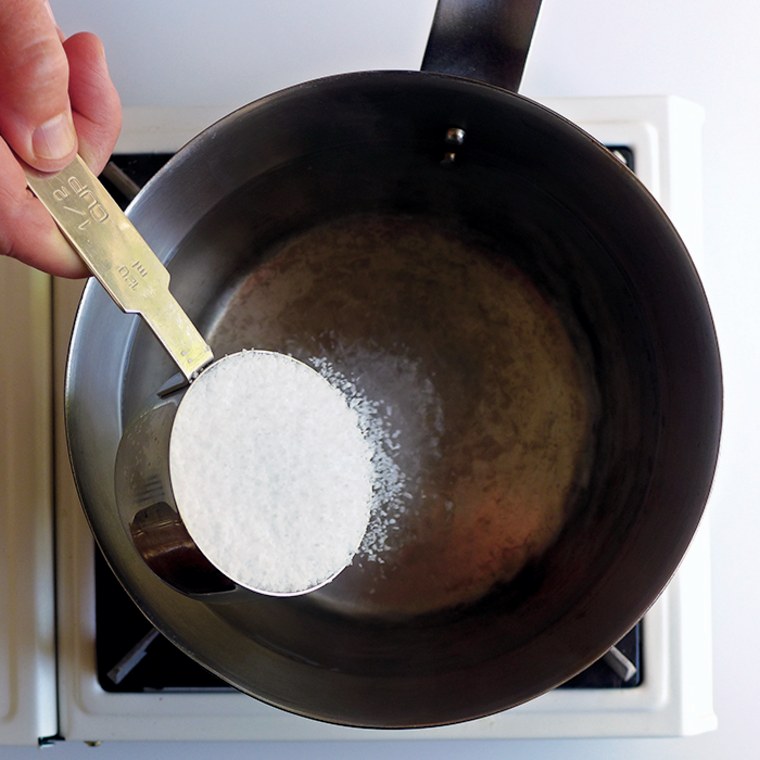
Very fresh eggs are tricky to peel when hard-boiled. The shell clings so tightly, it often tears and pockmarks the surface. Storing eggs in the fridge for a week or two before boiling them makes slipping off their shells easier. However, to peel very fresh eggs easily, we've come to rely on this trick: Add ⅓–½ cup salt to a pot of water (6–8 cups) and bring to a gentle boil.
2. Boiling water
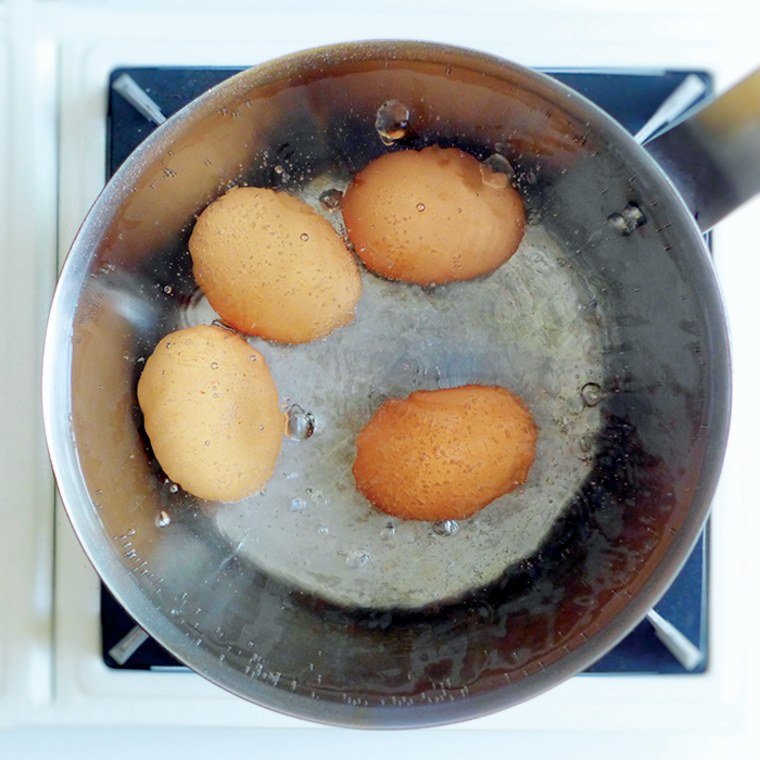
Adding eggs to gently boiling water takes the guesswork out of determining just when to begin timing your eggs. It also makes peeling them easier. Use a slotted spoon to carefully lower large eggs straight from the fridge into the gently boiling water. Boil the eggs in a single layer covered by at least 1 inch of water.
3. Cold water
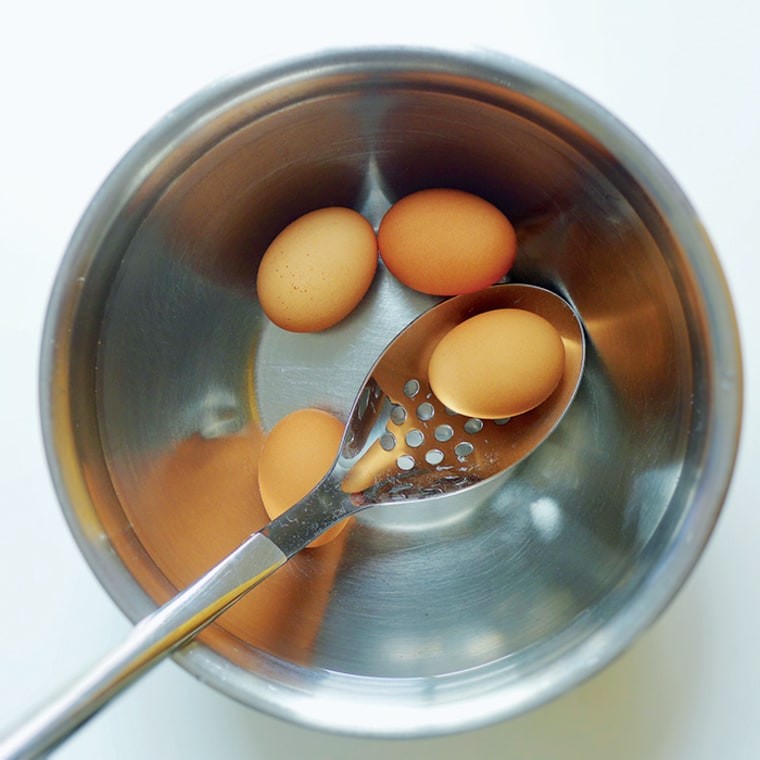
Unless you are making soft-boiled eggs, you need to quickly stop hard-boiled eggs from cooking beyond the desired doneness. Drain the eggs, then immediately submerge them in cold running water until they are cool to the touch.
4: Cracking & peeling
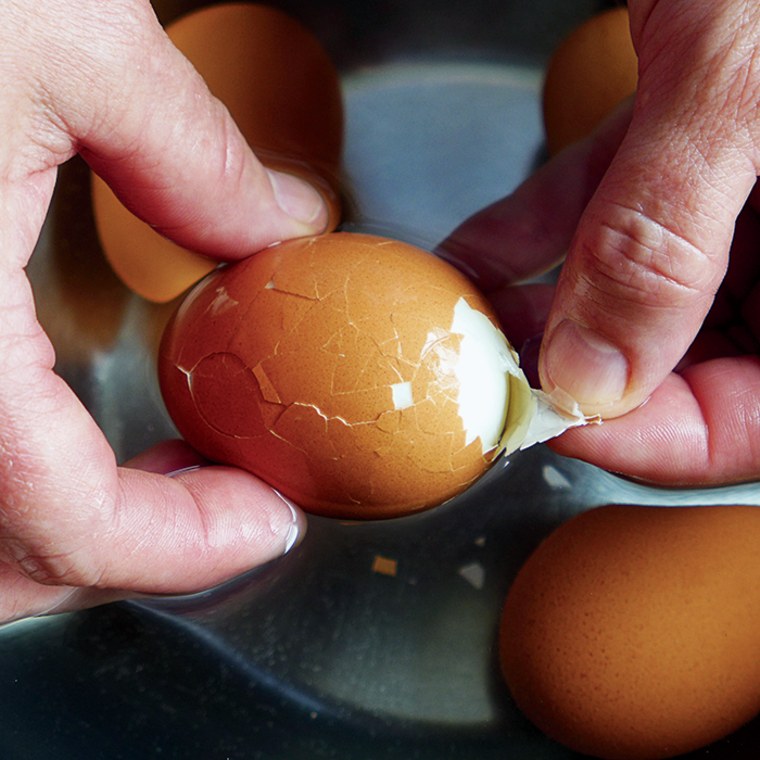
Tap eggs on a hard surface, cracking them all over. Peel off the shell, starting at the fatter end (where the air sac is). Dipping eggs under water will help. If not using uncracked, unpeeled eggs within 4 hours, keep them in the fridge.
Boiled eggs, four ways
The 5-minute soft-boiled egg
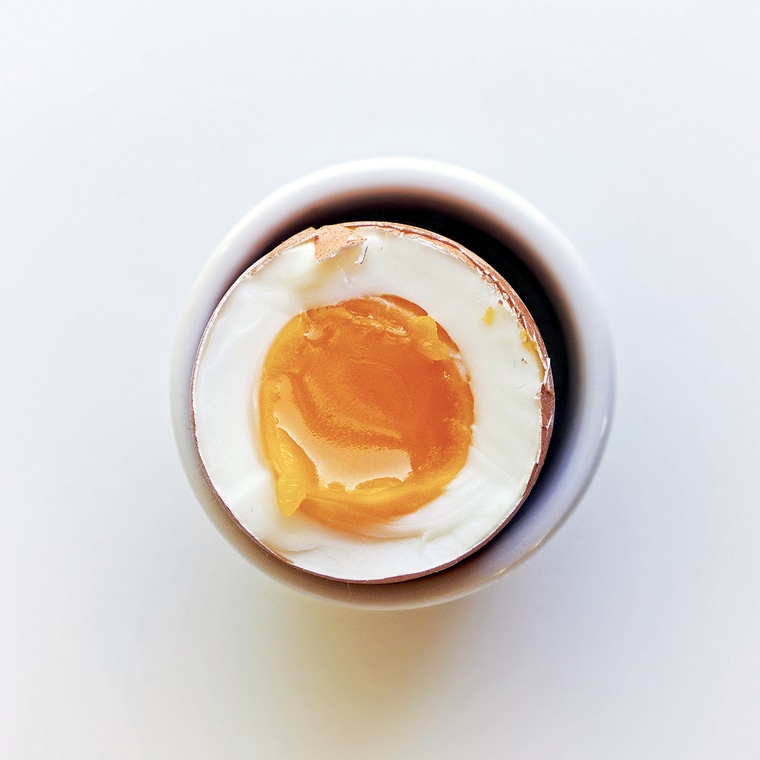
A perfect soft-boiled egg is a matter of taste. How soft or firm you like the yolk to be when you spoon into it will determine how long to boil the egg. A large egg straight from the fridge, submerged into gently boiling water and cooked for 5 minutes, produces a soft-boiled egg with a firm white and a warm, runny yolk that is just set around the outside. A perfect soft-boiled egg for some, just a minute shy of perfection for others.
The 6-minute soft-boiled egg
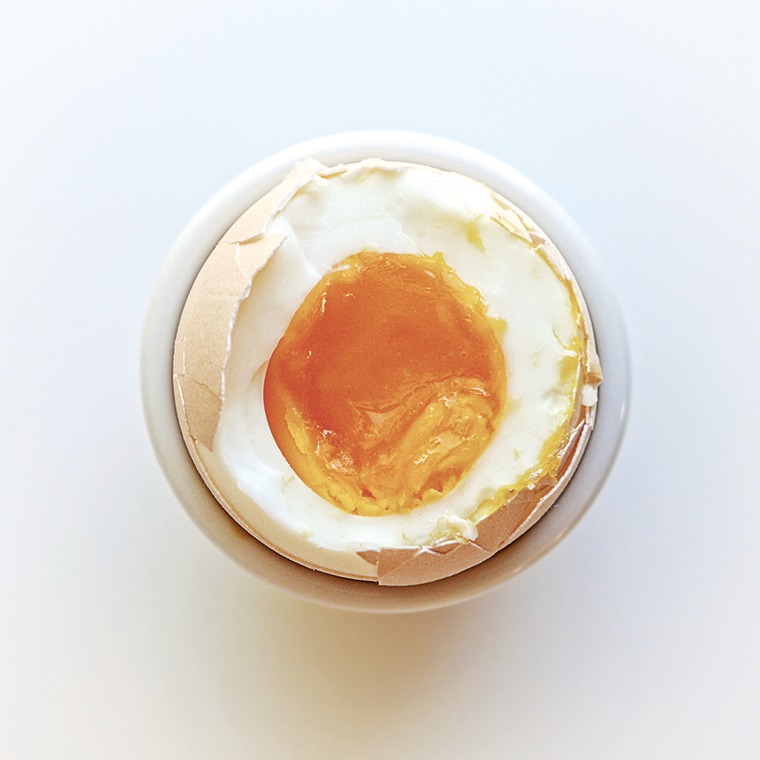
If you want a soft-boiled egg with a firm white and a warm, jammy yolk just a bit runny in the center, this one will suit your taste. Submerge a large egg straight from the fridge into gently boiling water and cook for 6 minutes.
The 11-minute hard-boiled egg
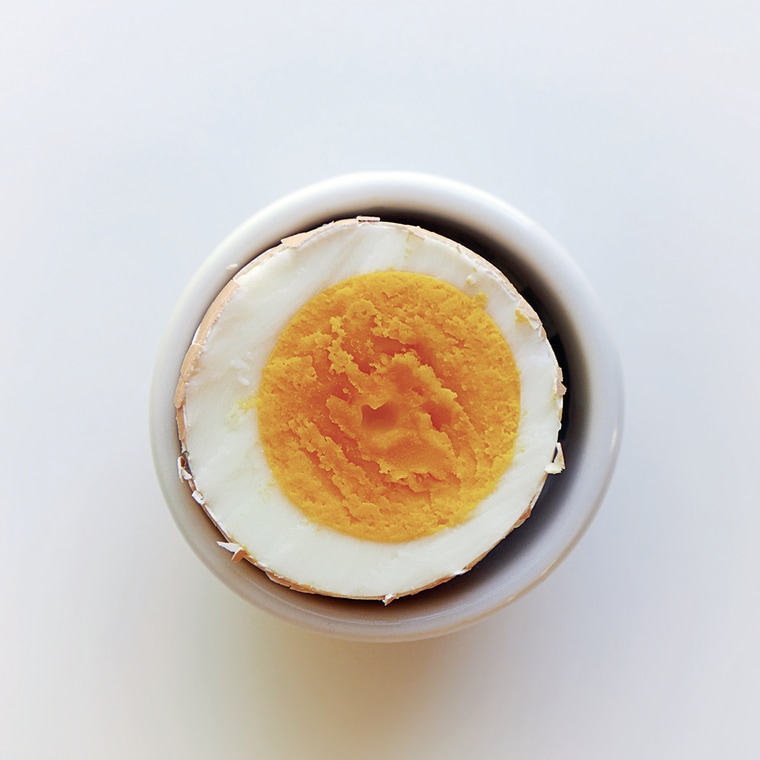
We like the texture and flavor of hardboiled eggs with a just-firm yolk, still moist in the center. Boiling large eggs for eleven minutes gives us these — our all-purpose hard-boiled eggs.
The 12-minute hard-boiled egg
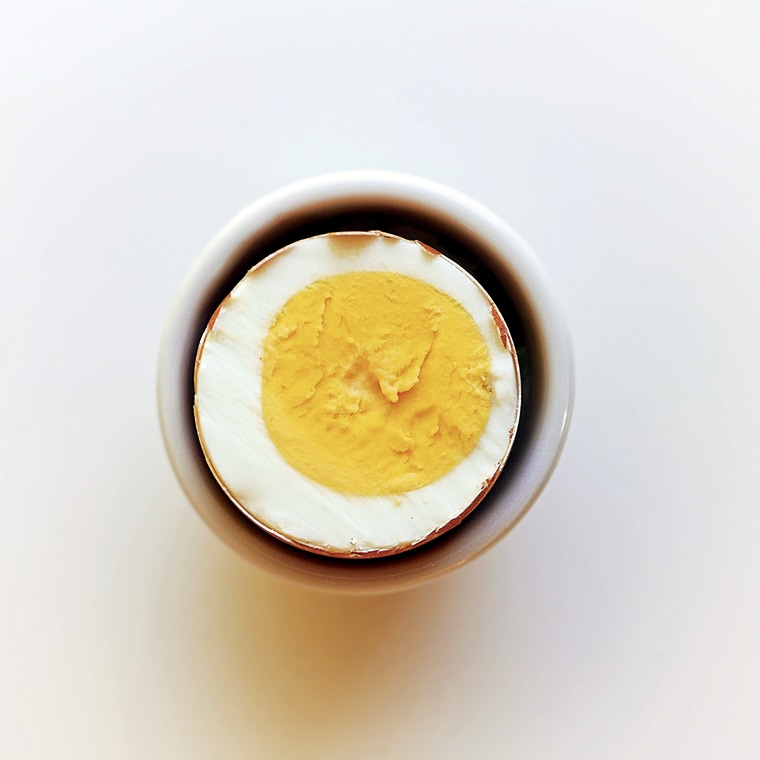
We boil large eggs for 12 minutes when we want firm, dry yolks without the dreaded green ring (which indicates an over-cooked egg). We use these to make deviled eggs. The yolks pop out of the whites easily and make the fluffiest filling.
boucicaulthato1970.blogspot.com
Source: https://www.nbcnews.com/better/lifestyle/4-foolproof-methods-make-perfect-boiled-eggs-ncna1066501